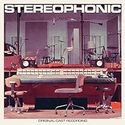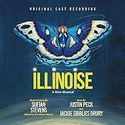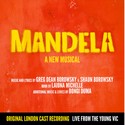|
 STEREOPHONIC STEREOPHONIC
ORIGINAL CAST
Sony Masterworks
CD | Digital
Classified as a play rather than as a musical, the award-winning Stereophonic takes place in a recording studio in 1976 as a fictional band puts together tracks for an album, sometimes heard in snippets in the show. But the cast recording lets us hear more of these original songs written by Will Butler (who co-orchestrated them with music director Justin Craig) in full-length versions. All of them are used as diegetic pieces–presented as the finished products or works-in-progress, rather than the genre of musical theatre's typical function of music and lyrics as sung dialogue/thoughts.
With the exception of some included bits of dialogue from David Adjmi's script, the release feels far more akin to material heard on the pop radio about half a century ago, with catchy hooks and mostly uncomplicated, relatable verbiage: soft rock with some edge and bursts of assertive energy. Those who've seen the show, or have been able to read up on it or read between the lines, will hear more than just palatable pop. The actors play their own instruments. Stereophonic presents the pieces as things written by the band members, perhaps with autobiographical content, sung sometimes in cathartic, heart-on-sleeve ways that amplify that. There are tensions among the bandmates as colleagues and friends, with two romantic couples who aren't living happily ever after.
Rather than lush and lively, the sound is mostly stark and languid, downbeat in mood even when the tempo is more upbeat. Chris Stack as the drummer keeps the beat. The timbres of female singers often project a sense of melancholy, rue, or low-flame anger, the singing bringing some stinging hurt that engenders sympathy. They are Rebecca Pidgeon and Juliana Canfield, playing characters in up-and-down relationships with the male band members portrayed by Tom Pecinka and Will Brill. The men's voices, if not as distinctive or charged with heartbreak, have some edge and can communicate a more subtle vulnerability at times. Harmonies feel natural, relaxed and "lived in," contrasting with the personal disharmony between characters.
If only more of the lyrics were as neatly rhymed as the name "Will Brill"! However, the expectation of having pure rhymes, typical in the genre of musical theatre, is far less strictly adhered to in rock, so the proliferation of near-rhymes in Stereophonic is suitably true to the style and time period invoked. For a representative example, the first track, a group number called "Seven Roads," starts right off with the "alone"/"home" would-be match, later offering the pairing of "breathe" and "believe," but there are several real rhymes in the lyric, too.
With the content modeled on accessible grooves and potential mass appeal hits, it's perhaps no surprise that there's much repetition for earworm status. Some selections' verbiage seems almost rationed, as short choruses or key lines come up again and again (and again), including long "outro" fades. Arguably, some might be thought of as the unnamed band's unfinished or partial products, subject to change in the world of the play as they are played back for feedback. The release consists of 14 tracks, but that doesn't mean 14 separate songs. "Bright" is heard in three versions and "Masquerade" is heard in two, while there are also a couple of brief conversations (Andrew R. Butler and Eli Gelb, in the roles of the engineers, are heard speaking, too).
Don't approach Stereophonic with stereotypical expectations one has for cast albums. Let it grow on you. An initial, casual listen may be pleasant, if not fully engaging for those looking for something more theatrical pizzazzy, but there's an unforced "real feel" and return visits become more rewarding.
 ILLINOISE ILLINOISE
BROADWAY CAST
Nonesuch Records
CD | Digital
While those attending Illinoise in the theatre may have much of their attention commanded by the dancing that communicates story and emotion, listeners to the cast recording can more easily and rewardingly keep their focus on the audio elements accompanying the movement. And that's plenty to drink in and be swept up in. The poignant music and lyrics are by Sufjan Stevens, who released his own captivating studio recording of the ambitious material back in 2005. The whirlwind of songs, which can feel delicately poetic or dramatically powerful, is delivered in this stage incarnation by three singer-musicians with grace and a kind of liquid legato flow: Shara Nova, who did some background vocals on the original album, is one of the guitarists, as is Tasha Viets-VanLear (and she's also on percussion) while Elijah Lyons plays keyboards. Other instrumentalists are led by Nathan Koci (who's also on piano and banjo), with exquisitely artistic arrangements and orchestrations by Timo Andres. Illinoise is not without its enigmatic aspects, wrapped up in gossamer, with some gutsiness, satire, quirkiness, and sorrow in the mix.
In solo passages and complementary combinations, the three vocalists cast a spell. If the atmospherics and blend start to feel too similar, the subjects addressed by the compelling-voiced singers in the narratives and declarations are enormously varied. These include romantic passion, religion, suicide, Pulaski Day, cancer, the living dead ("Zombies"), and UFOs. Name-dropped are a few American presidents, Frank Lloyd Wright, the Devil, God, and various cities in Illinois as well as the Chicago Cubs and tourist attractions, etc. While some lyrics are dense with words, the vocals on "The Long Hike" are nothing but the open-vowel sound of "Ah" and three of the 18 tracks are instrumentals.
The songwriter's personal experiences with religion and falling in love with a man who died provided some inspiration, as did Illinois history and political/social issues. Many passages have a haunting quality, either tender or–contrastingly–forceful. Some complex numbers use the device of repeated short phrases that anchor them, the words coming across as mantras or affirmations, such as "All things go" and "I don't mind" in "Chicago" (a song that is reprised) or "We were in love" and "I can wait" in a selection with the title "The Predatory Wasp of the Palisades Is Out to Get Us!" Here's an excerpt from "Come On! Feel the Illinoise!" that showcases the kind of rapid-fire rhyming that Sufjan Stevens can do when he chooses to use that muscle: "Ancient hieroglyphic/ Or the South Pacific/ Typically terrific/ Busy and prolific/ Classical devotion,/ Architect promotion/ Lacking in emotion." In the same song, he switches his M.O. and uses that technique of effective repetition, asking pointedly four times in a chorus which itself is heard twice: "Are you writing from the heart?" ... I think he was.
 MANDELA MANDELA
2022 LONDON CAST
Center Stage Records
Digital
Next month's International Nelson Mandela Day (established by the United Nations to begin in 2010) celebrates the life of South Africa's anti-apartheid activist–and that country's president from 1994-99–and a bio-musical tracing his life honors him, too. Simply titled Mandela, it was produced at the Young Vic in London, and a 23-track live recording showcases its earnestness, strong vocal performances, and vibrant energy. Directed by Schele Williams (who recently took on the same duties for two productions currently on Broadway, The Notebook and The Wiz), this British mounting was done with the involvement of the Mandela family. It is, in a word, intense.
Music and lyrics, replete with dignity and drama (some will say melodrama), are by two brothers from South Africa, Greg Dean Borowsky and Shaun Borowsky, with additional song material by Bongi Duma.
Quite a few numbers, in varying amounts, include lyrics sung in the native languages, but the stirring harmonies and powerfully pounding sounds offer some consolation for whatever frustration and confusion may arise from feeling "left out/left to guess" from context clues of the situations, attitudes, and the English portion. A glance at a few of the tracks' titles gives a hint of what's expressed as Mandela rallies the people, undergoes the ordeal of being imprisoned for 27 years, perseveres, and becomes a hero: "The People Have Spoken," "An Ideal," "Just Hold On," "What Freedom," and "Legacy." Another advocates fighting "Fire with Fire."
Songs and some spoken material (the bookwriter is Laiona Michelle) radiate hope and faith, while some moments when hope seems absent or rage takes over are chilling. Michael Luwoye is suitably heroic and strong-voiced as the title character, focused and formidable. Danielle Fiamanya, as second wife and dedicated keeper of the flame, Winnie Mandela, soars on the loving "Piece of Us" and, when she leads a reprise of "Fire with Fire" and explodes in "Forgotten," her ferocity feels unbridled. A moving moment comes when Leanne Robinson and Nomfusi Ngonyama, as the young daughters, sing of the happy times they believe will come soon when their father is back home, imagining "What Tata Will Say." Some other tracks lack its specificity and can feel too similar to each other.
Admirable work from other cast members and the robust chorus add to the impact of the presentations of tragedy and triumph. Musical director Sean Mayes oversees a mighty orchestra, but allows some subdued sections. The lengthy Mandela cast recording may feel overwhelming or overreaching in toto, but is a noble effort that reminds us of the lionized figure and true survivor.
|
|